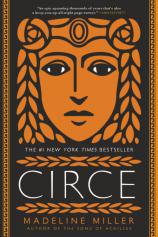Circe
Review
Circe
There is a copy of Rick Riordan’s THE LIGHTNING THIEF on my desk, the book that first got me invested in Greek mythology. Its pages yellowed and battered to the point where you’d think it was an ancient text, I pored over it again and again since my teacher gifted it to me in fifth grade. Percy Jackson’s friends became as familiar as my own, and the gods and monsters he faced unlocked doors in my imagination I didn’t know were there. I didn’t just want to read about Percy; I wanted to be him. However, with the realization dawning on me that I was no son of Poseidon as Percy was, I stopped reading his adventures long ago, but my love for Greek myths never faded. If his stories embodied my childhood imaginings and desires, then Madeline Miller’s CIRCE embodies my adult introspection and retrospection.
Those familiar with the millennia-old tales of the Greeks will recognize mythological figures leaping from the pages: wind-swift Hermes, Daedalus the craftsman, resilient Odysseus --- the list goes on. Make no mistake, though: as fresh as all of Miller’s renditions of these characters may be, they ultimately serve to reveal hidden facets of Circe. Although contained to her island of Aiaia, she is the heart and soul of this book, and her transformation as a character is as potent as any of her draughts.
"CIRCE is an enchanting read from start to finish, whether you’re a Greek geek or someone who just wants a well-told story."
Beginning with Circe’s early days slinking unnoticed through the halls of the Titans --- immortal beings of whom she is one, and who bear blood ties to the Olympians --- Miller quickly makes it clear that Circe is...well, different. She does not partake in the same pleasures as her eternal kindred, does not seem to possess even a hint of her lineage’s power, and is far more interested in mortals than she has any right to be. All of these things set her apart and make her an outcast; whatever relationships she forms, then, she clings onto for dear life, for fear that she will find no others. When she learns to harness the power of pharmaka, herbs grown from the blood of gods, she reins in that fear, but redirects it poorly, out of young love and jealousy. This results in her exile, and her journey --- if you want to call it that --- as the first witch begins.
Again, where Miller succeeds in detailing this journey is the characters. Not everyone lasts an eternity as Circe does, but many last long enough to leave an impression on her, and us. Daedalus in particular is a delight to read, as much a prisoner to his own fate as Circe is to her island. Beaten and scarred from his time at the workbenches and forges that are his due, his mind is as sharp as any of his tools. Telemachus, son of Odysseus, and Telegonus, bastard son of Odysseus by Circe, leave their individual marks, too.
Miller’s stylistic trappings are as vivid as any of her characters. It’s been a long time since I’ve read such luscious prose, striking the perfect balance between easy to read and complex enough to be savored. Like Circe, she is a witch, though of words rather than potions: gathering the best ingredients she can find, combining and mixing them with utmost care, and delivering the results in just the right time and place. I have read stronger dialogue --- though it is certainly nothing to scoff at --- but Circe’s stream-of-consciousness narration was constantly engaging, filled with quotable moments galore. (Among my favorites: “Is there a moment that a heart cracks?”)
The writing isn’t just gilded sheen, either: there is great depth to the story of Circe. There are gods, yes, and monsters too, but more than anything there is an examination of what it is to be mortal through the eyes of one who is immortal. To be human through the eyes of one who is more than human. To be woman through the eyes of a goddess. To know what it is to feel real pain, real loss, real love --- foreign concepts on the shining peaks of Olympus, yet ever-present on Aiaia. Through all this, Miller mines the depths of myths known around the world, imbuing Circe with new life and making her more relevant than ever.
If I have one qualm about CIRCE, it’s the pacing. Because it’s more a character study than anything else, the book’s individual moving parts sometimes felt odd juxtaposed. It was somewhat jarring, for instance, to witness a battle against a monster after pages and pages of isolation and thought. Maybe that was the point --- to throw us into the thick of it after so long alone, just like Circe --- but either way, I’m up for a good monster fight any day of the week. Nothing ever took me completely away from the trials, tribulations and triumphs of Circe, and that’s all that mattered. CIRCE is an enchanting read from start to finish, whether you’re a Greek geek or someone who just wants a well-told story.
Reviewed by Benny Regalbuto on April 12, 2018
Circe
- Publication Date: April 14, 2020
- Genres: Fantasy, Fiction, Historical Fantasy, Historical Fiction, Mythology
- Paperback: 416 pages
- Publisher: Back Bay Books
- ISBN-10: 0316556327
- ISBN-13: 9780316556323




